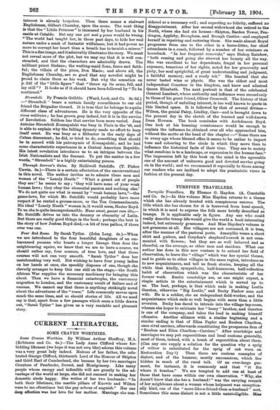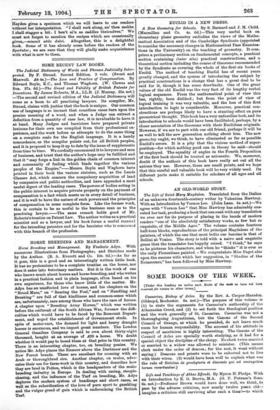TURNPIKE TRAVELLERS.
Turnpike Travellers. By Eleanor G. Hayden. (A. Constable and Co. 6s.)—In this volume Miss Hayden returns to a theme which she has already treated with conspicuous success. The title which she has chosen for it is borrowed from local speech, in which it is used to express the folk more briefly described as tramps. It is applicable only in figure. Any one who could really describe tramp life would give the world a book interesting indeed, but extremely gruesome. And Miss Hayden's volume is not gruesome at all. Her villagers are not costumed, it is true, after the manner of the pastoral poets. Amaryllis wears a short skirt and gaiters, and Corydon's shepherd's-crook is not orna- mented with flowers ; but they are as well behaved and as cheerful, on the average, as other men and maidens. What our author has done in this new venture is to extend her field of observation, to leave the "village" which was her special theme, and to guide us to other villages in the same region, introduce us to new acquaintances, and tell us fresh stories, keeping all the while that kindly, sympathetic, half-humorous, half-reflective habit of observation which was the characteristic of her former work. Rustic courtships are, as one might expect, a staple article in the entertainment which is served up to us. The best, perhaps, is that which ends in making Leetle Gersten, otherwise "Big Leetle," and Becky Paslow man and wife. He is a soldier, she an independent field-worker, and the acquaintance which ends so well begins with more than a little aversion. Becky has dared to intrude into the village tap-room, whence she hopes to extricate her " beery " brother, and Garston is one of the company, and takes the lead in making himself offensive. Another alliance with a similar beginning and a similar ending is that of Eliza Pepler and Reuben Charlton, once rival carriers, afterwards constituting the prosperous firm of "Reuben and Eliza Charlton—Carriers." After courtships and marriages we may put superstitions and local customs generally, most of them, indeed, with a touch of superstition about them. (Can any one supply a solution for the question why a sprig of willow is substituted for the sprig of oak worn on-
Restoration Day ?) Then there are curious examples of dialect, and of the humour, mostly unconscious, which lies hidden in much of the rural talk. Of an over-large gar- ment, for instance, it is commonly said that "it fits where it touches." We are tempted to add one at least of those that have come within our own observation. "Why, she doesn't know that she has a husband!" was the envying remark of her neighbours about a woman whose helpmeet was exception- ally kind, one of the " more-like-a-friend-than-a-husband" sort. Sometimes this same dialect is not a little unintelligible. Miss
Hayden gives a specimen which we will leave to our readers without her interpretation. "I shall rock along, an' then mebbe I shall stagger a bit : I bent ern as caddies theirselves." We must not forget to mention the recipes which are occasionally given,---miscuit utile dulci. Altogether, this is a delightful book. Some of it has already come before the readers of the Spectator; we are sure that they will gladly make acquaintance with what is new to them.







































 Previous page
Previous page